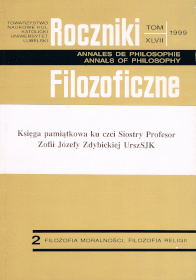Normatywna moc prawdy
Abstrakt
The basic thesis in the article says that the truth has a normative authority. In his considerations the author first of all tries to follow St.Thomas Aquinas’ thought. St.Thomas stressed more strongly than other thinkers the various meanings of the binding power of the truth, although the idea of „the ethics of being faithful to the truth” (mainly discussed in § 3) is contained in contained rather in St.Thomas’ system implicitly and not expressed explicitly. Taking into consideration Cardinal K. Wojtyła’s work is very helpful in making it explicit. The author shows the sense of the basic theses on three planes. First (§1) he analyses St. Thomas’ definition of truthfulness and discusses its rank and range, as opposed to various kinds of lies, and especially he looks for motives that made both St. Augustine and St. Thomas evaluate every kind of lie very negatively. Next (§ 2) he analyses a deeper meaning of „the truth as a virtue”, that is closer to the modern postulate of an authentic life. This, however, in St. Thomas’ work, finds its ultimate foundation in God, which reveals a deeper sense of righteousness as an expression of being faithful to the truth. The last part of the considerations (§ 3) is devoted to an explanation of the question: in what sense and why does any cognitive act by which one learns the truth carry a moral charge with it – a charge so strong that departure from the truth, even most banal, inevitably harms the subject itself that is a rational being.
Copyright (c) 1999 Roczniki Filozoficzne

Utwór dostępny jest na licencji Creative Commons Uznanie autorstwa – Użycie niekomercyjne – Bez utworów zależnych 4.0 Międzynarodowe.





